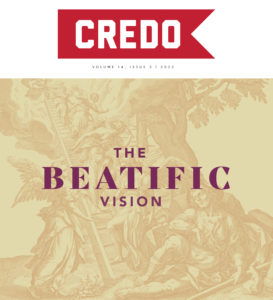You have heard it said, we should not be so heavenly minded that we are of no earthly good. I have yet to meet such a Christian. In my experience most struggle with the opposite imbalance: they are so earthly minded they are of no heavenly good. As a result, holiness lacks luster. Programmed by pragmatism, they are not postured heavenward and their pursuit of holiness in this life is anything but coram Deo, before the face of God. Holiness quickly turns into a façade. For there is no longer a first principle—someone who is Holiness himself—who defines the direction of our gaze. An unhappy legalism may follow. For a comatose obedience is inevitable where regulations burden our backs without that blessed hope on which all our happiness depends.
The apostle John’s outlook on eschatology might be the remedy we need. After warning his readers against the allure of antichrists to come, the apostle positions these feeble Christians to abide in the Son and in the Father by means of the grafting power of the Spirit. Abiding will prevent them from shrinking back on the day of Christ’s return (2:28). Such confidence is not the product of a self-enthused magnanimity but stems from the love that the Father has given to his children, the same love that made them children of God to begin with (3:1). Godliness is galvanized by the chance that he, a mere mortal, might see the King of the ages, the immortal, invisible, the only God. Click To Tweet
Yet the confidence John infuses within the Christian imagination not only stems from what God has done but what God will do still. John uses a tender but fortifying address—Beloved—to summon God’s people to the hourglass of time. For “what we will be has not yet appeared; but we know that when he appears we shall be like him, because we shall see him as he is” (3:2).
In his homilies on 1 John, Augustine says the key that unlocks verse 2 is that word “is.” The reason the vision is so beatific is due to the object of our gaze. The One who “is,” says Augustine, “is something unchangeable.”
It abides forever, it cannot be changed, it is not subject to decay in any part. It neither advances, because it is perfect, nor falls back, because it is eternal.
Such sight is the privilege of faith. The wicked have no such privilege. “The wicked can’t see Christ in this way, in the form of God, as the Word of God, as the Only-Begotten of the Father, as equal to the Father.”
For Augustine, the visio Dei is spectacular, exceeding the parameters of our present existence. No eye has seen nor ear heard what this vision will entail (1 Cor. 2:9), “a certain surpassing vision that excels all the earthly beauties” says Augustine. The beauty of stars, sun, moon, angels do not compare because all else is beautiful only by participating in God. In other words, all that participates in The Beauty cannot grant us the happiness guaranteed in the vision of God. For he is Beauty itself and without measure.
Seeing God is so delightful and the happiness it promises so fulfilling that the Christian who looks for its arrival does so out of a reservoir of desire. Right now, the Christian does not see God, so his task is to desire the vision of God. “The entire life of a good Christian is a holy desire.” However, such a desire must be stretched. Augustine uses the illustration of a purse that can contain its wealth but only if it expands.
But by desiring you are made large enough, so that when there comes what you should see, you may be filled. For, if you wish to fill a purse, and you know how big what will be given you is, you stretch the purse…
Augustine postulates that God may delay the beatific vision so that we can be stretched further still. “This is how God stretches our desire through delay, stretches our soul through desire, and makes it large enough by stretching it.”
Yet the need to be stretched is not the only preparation necessary for seeing God. A cleansing must occur as well. For John, the glorification of the Christian rests on the foundation of the beatific vision itself. When we see our Redeemer, then we will be conformed into his image at last. And yet, such hope does not leave holiness to that future day alone, as if the Christian life until then is but a mere desire for consecration—somewhere, somehow, someday. Rather, the promise of the beatific vision is like fuel, like coals thrown in the oven of godliness. “And everyone who thus hopes in him purifies himself as he is pure” (3:3). You must be filled with the good; pour out the bad. Consider that God wants to fill you with honey. -Augustine Click To Tweet
Again, Augustine is ready with an illustration. If our desire for the beatific vision is like a purse that must be stretched, our preparation for this vision is like a cup that must be filled. But with what?
This is our life—to be exercised through desire. But, to the degree that a holy desire exercises us, we have cut off our desires from love of the world. …”Empty what must be filled.” You must be filled with the good; pour out the bad. Consider that God wants to fill you with honey. If you are full of vinegar, where will you put the honey? What the vessel was carrying must be poured out; the vessel itself must be cleaned; it must be cleaned, even strenuously and by rubbing, so that it may become suitable for a particular thing. … Let us stretch out to him so that, when he comes, he may fill us.
Does John not say the same at the conclusion of his first letter? “Little children, keep yourselves from idols.” For if the vinegar of idolatry fills the cup what room is left for the honey of doxology? Therefore, the Christian petitions his Lord for the grace necessary to endeavor such a steady consecration. “You make yourself pure,” said Augustine, “not of yourself but through him who came to dwell in you.”
Out of what spirit then does such a consecration occur? The pilgrim on his way to see the King does not say out of a spirit of reluctance, “I suppose I must prepare myself for the King.” As if he is sacrificing something better to enter the king’s palace. Instead, he says out of a spirit of exuberance, “I cannot believe I have the privilege of entering the presence of the King! I must get ready to meet him.” The pilgrim who believes his King is waiting on his arrival does not run out of mere duty but expediency. Godliness is galvanized by the chance that he, a mere mortal, might see the King of the ages, the immortal, invisible, the only God, to whom belong honor and glory forever and ever (1 Tim. 1:17).
Here is the telos of faith. Here is the telescope of hope. Here is where love meets its Lover.


